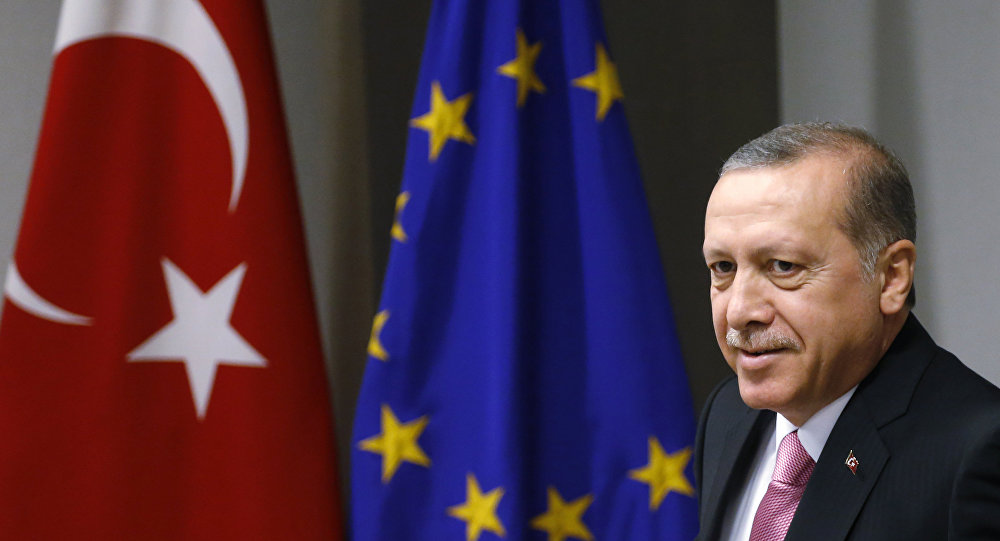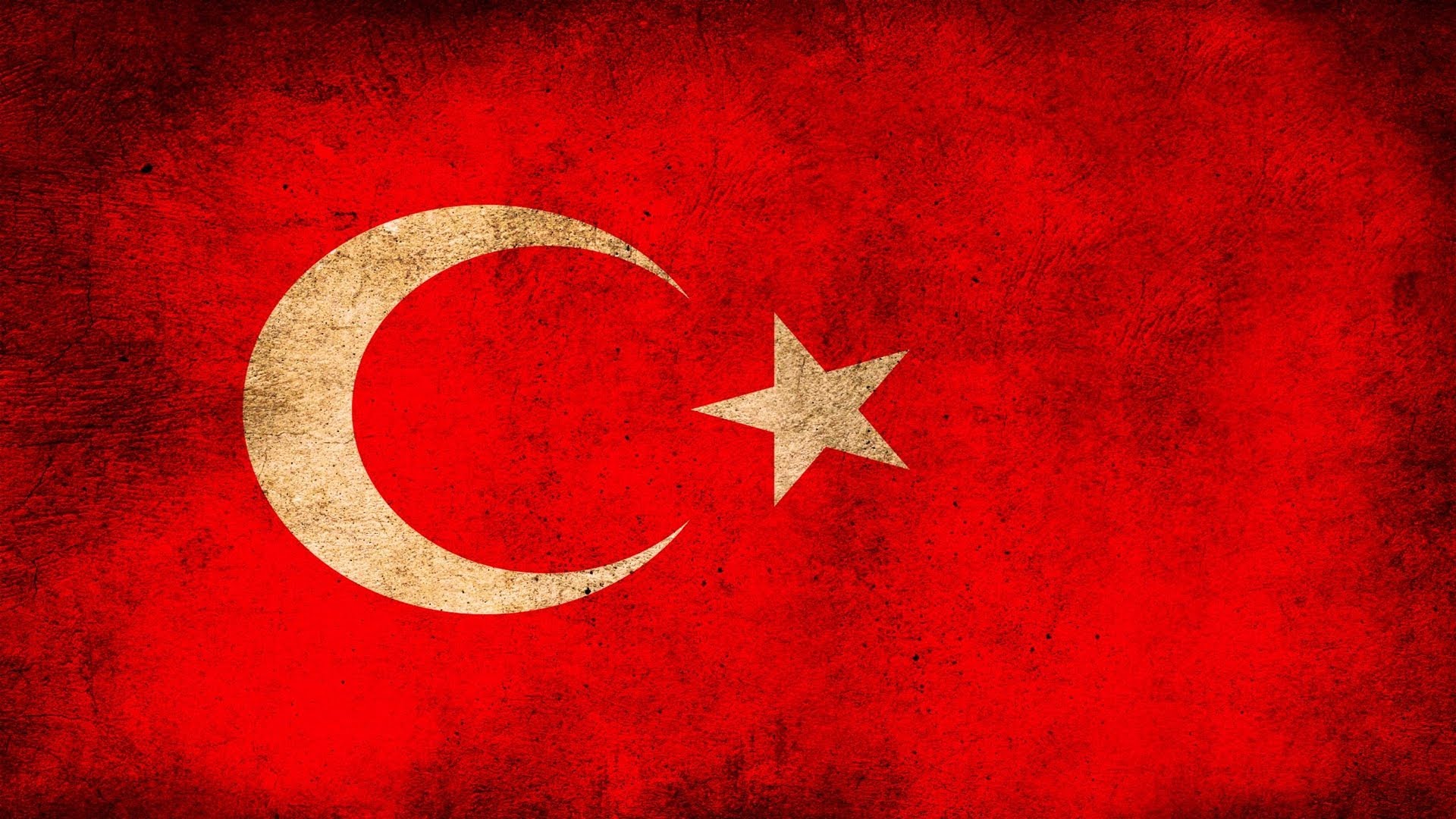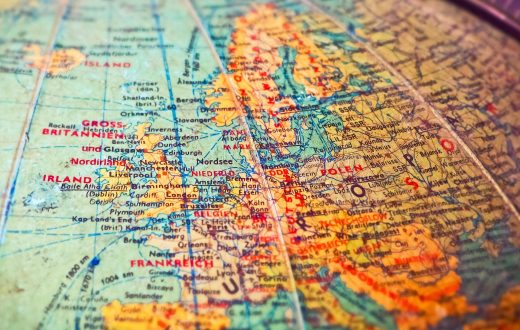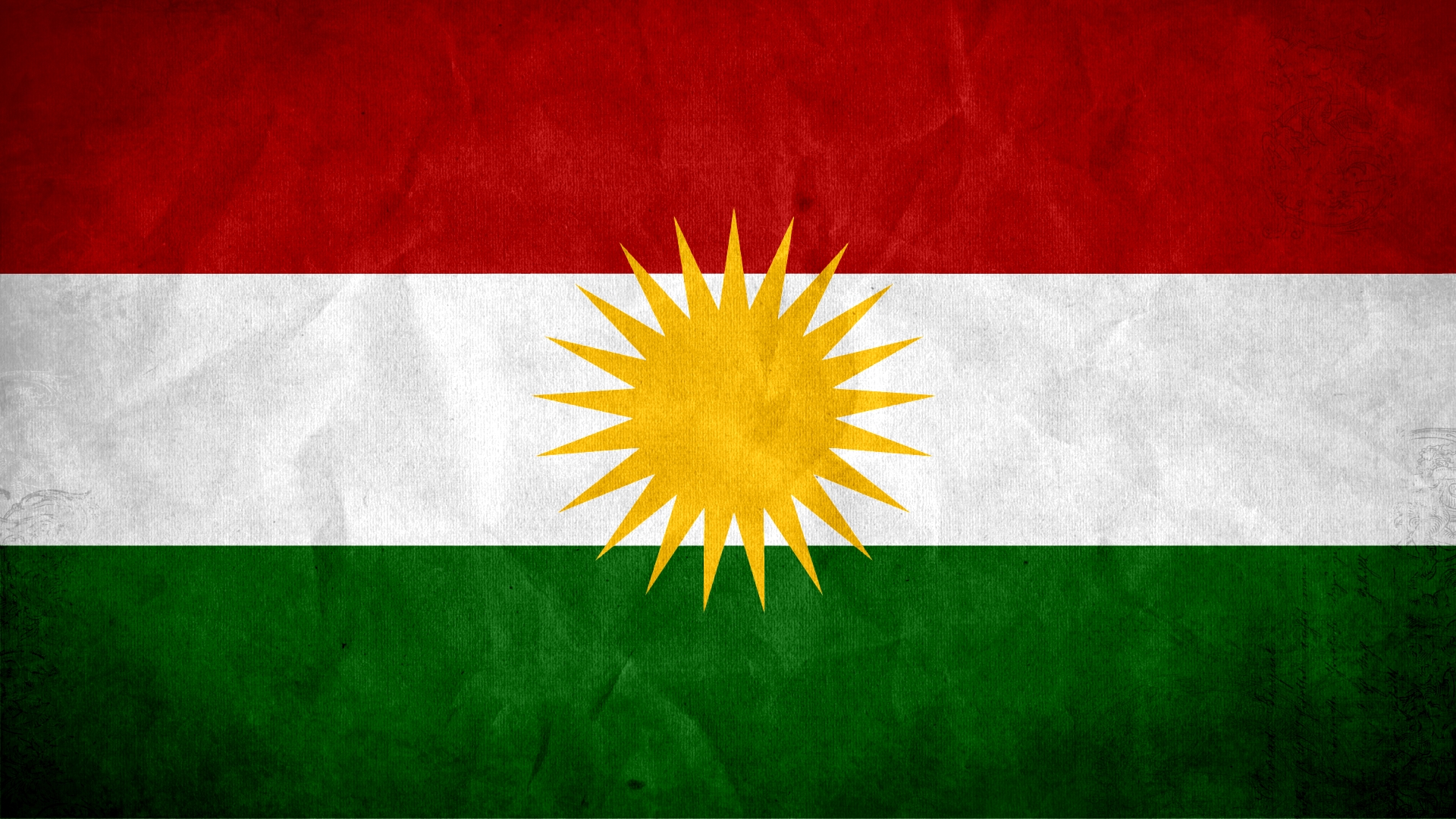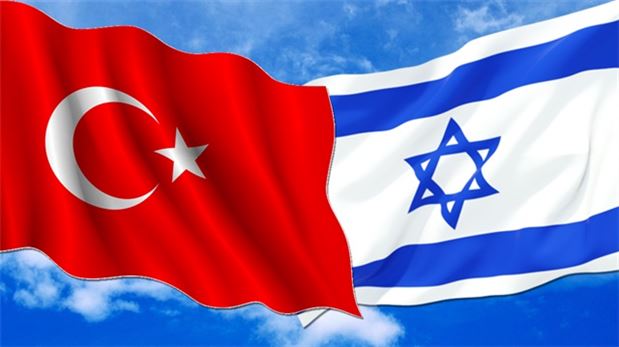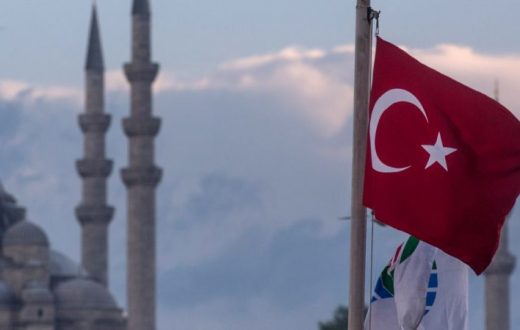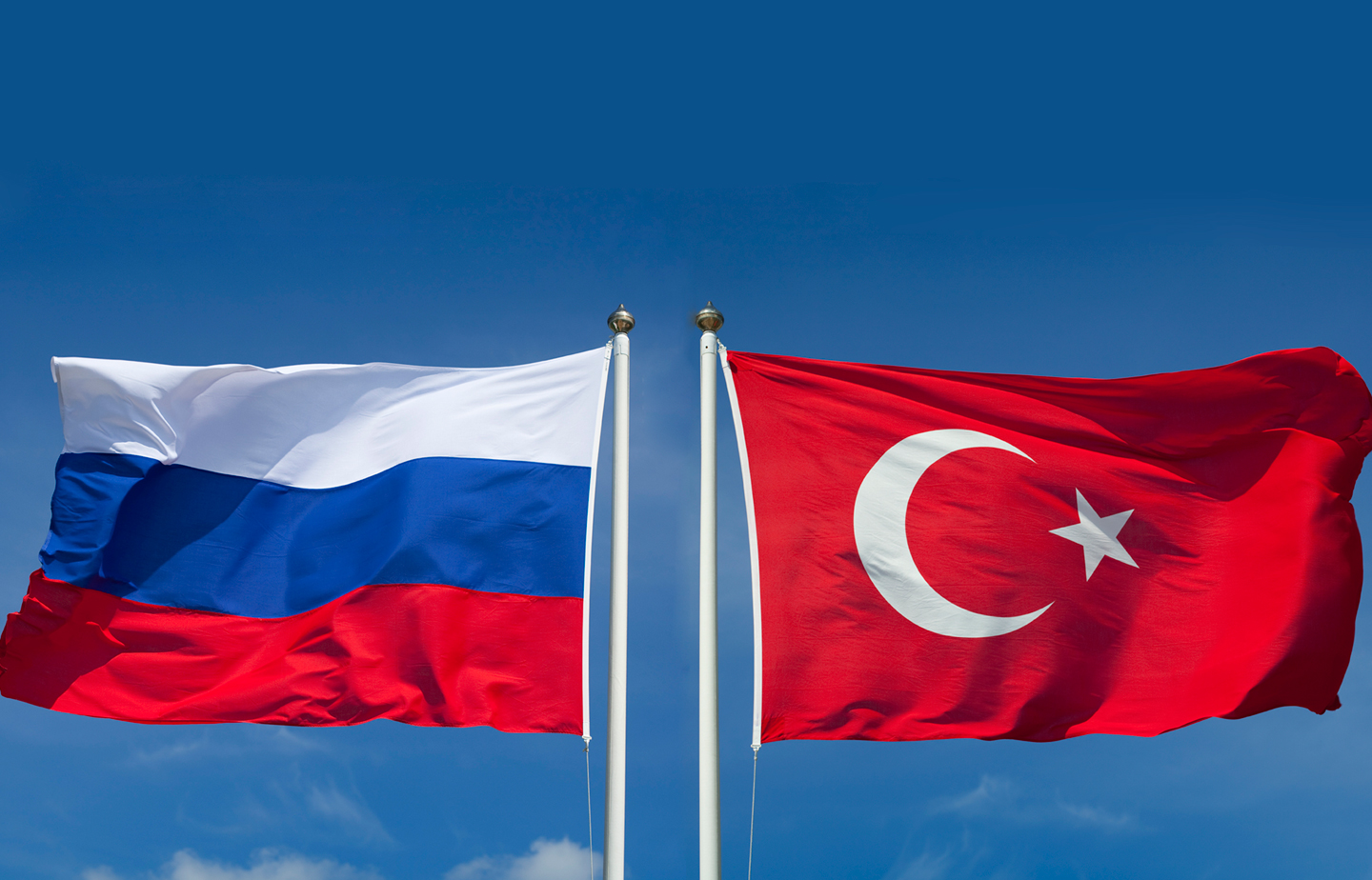I know it can be quite a nail-biting time for you wondering what the hell the “Osmanlı Tokadı” could be. – “Osmanlı Tokadı” means an Ottoman slap; it is a kind of weapon of Ottoman soldiers during the Ottoman Empire. They used to use their hands when they become armless and unweaponed to impact the enemy. It is a really strong slap that would preferably create a strong sound and cause the victim to count some starts above their heads. Therefore, it could be even mortal. The soldiers used to make their training by slapping big marbles to build hand muscles.
Growing Diplomatic Rift
— with full respect to Turkish President Recep Tayyip Erdoğan — It seems obvious that he is trying to make his final training and building hand muscles by slapping Berlin Wall and The “Magere Brug” of Amsterdam – accusing Berlin and Amsterdam of “fascist actions” reminiscent of “Nazi practices” in a growing diplomatic rift over the cancellation of political rallies last week; aimed at propping support for him among the approximately three million Turks living in Germany, after German authorities withdrew permission for two rallies by Turkish citizens in some German cities, at which Turkish ministers were to urge a “Yes” vote in a referendum next month on granting Mr. Erdoğan sweeping new presidential, almost dictatorial according to some observers.
“In Germany, they are not allowing our friends to speak – let them do so. Do you think that by not allowing them to speak the votes in Germany will come out “No” instead of ‘yes?’” Mr. Erdoğan said at a rally in Istanbul.
“We will talk about Germany’s actions in the international arena and we will put them to shame in the eyes of the world, I’ll go to Germany when I want, and if you don’t let me in, I’ll make the world rise to its feet!” the Turkish president stressed and added “We don’t want to see their fascist actions. We thought that era was in the past, but apparently it isn’t.”
Not only slapping Germany, however, Mr. Erdoğan took the battle to Amsterdam as well, called Dutch government “Nazis” after Turkish foreign minister’s plane prevented from landing in Netherlands.
“They do not know politics or international diplomacy… these Nazi remnants, they are fascists. You can stop our foreign minister’s plane all you want, let’s see how your planes will come to Turkey from now on,” Mr. Erdoğan told booing crowds in Istanbul.
Perhaps, just like many observers around the globe, you have been wondering, why the hell Mr. Erdoğan has been a warmonger and reacting like a stubborn child that cannot have his way to Europe?
Mr. Erdoğan’s desire to win over the Turkish diaspora in Europe is easy to be understood – and suddenly Turkish ministers are showing up in European Union [EU] countries, urging the local Turkish population to say yes to the proposed constitutional reform. However, Europeans are not enthusiastic about the upcoming changes to Turkey’s constitutional framework. Probably, because most of the European leaders are not aware of Mr. Erdoğan’s ambitions in the Middle East and North Africa [MENA] region, or do not understand Turkish domestic politics – or rather, they just did not really care until he has surprised them by giving Germany and Netherlands public slaps across the face, instead of giving them an Ottoman kiss across the check.
If you really want to understand Mr. Erdoğan’s inner desires and Turkey’s new foreign policy direction; then you should go back to the Turkish modern history in order understand Turkish domestic politics, and where the Turkish political system might be headed under Erdoğan. Something few thought possible a decade ago — one should be careful about underestimating Mr. Erdoğan. His sheer ambitions are something to behold. Mr. Erdoğan has a long story on a large and sinister campaign to slap and destroy his political opponents. His domestic slaps began by jailing military officers, hundreds of journalists, university rectors, aid workers-on trumped-up charges and fabricated evidences.
In 1999, Mr. Erdoğan was a young politician with black mustache and religious convictions regarded as a successful mayor of Istanbul – one of the world’s largest cities – went to jail. Because he had publicly proclaimed an inflammatory reference to a Turkish poem saying that: “The mosques are our barracks, the domes our helmets, the minarets our bayonets and the faithful our soldiers…” After release from jail, he altered course and with others founded the current ruling Justice and Development party “AKP” in 2001, espousing a more liberal and tolerant political theology.
Erdoğan and Ergenekon
In the emergence of Turkey’s ruling Justice and Development Party (AKP) in 2002, Mr. Erdoğan and large groups of politics, business, media, academia, and the moderate Islamic religious movement led by charismatic cleric Fethullah Gülen were all on the same boat against the presence of a «deep state» in Turkey. This deep state had fomented three past military coups d’état; according to some authors. The Turkish deep state, composed of intelligence officials and nationalistic military, was known as «Ergenekon».
As the game goes on, Mr. Erdoğan began accusing all of his political opponents of being Ergenekon cabalists. The increasingly AKP government began charging anyone that stands against AKP – Kurds, Armenians, journalists, academics, members of the Constitutional Court, non-Ergenekon members of the military, anyone with mustache or without mustache, and leaders of the opposition parties with being part of Ergenekon. Soon, after his regime grew up and was confident that the secret movement of Ergenekon can no longer threat his regime; Mr. Erdoğan turned his conspiracy-ridden eyes toward his former strongest ally Mr. Gülen and his followers known as Gülenists. In a few years, the relationship between the two leaders began to split, the alliance between them ended in 2013. Mr. Gülen seemed to withdraw his support from Erdoğan by 2011. Since, Erdoğan, totally suffering from delusional paranoia, was instituting the same type of «deep state» he believed was a threat to him; a «parallel government».
Erdoğan Government and the Gülen Movement
The movement; known in Turkey as “Hizmet,” or service – runs schools all over Turkey and around the world. A well-organized community of people, the movement is not a political party – named after the U.S-based Islamic cleric Fethullah Gülen.
Mr. Gülen is not a political dissident and does not run any official political party; contrary to the way that many Western and Arab writers describe him. – It’s a misconception and I don’t really know what let them put Mr. Gülen at the political opposition camp, some of those writers even called him Abdullah Gülen!
Fethullah Gülen is an influential Islamic cleric, regarded by followers as a spiritual leader and sometimes described as Turkey’s second most powerful man, living in exile in the United States and a former close ally of Mr. Erdoğan’s AKP. Mr. Erdoğan was very close to him for decades – some analysts are about to believe that Mr. Gülen is the one who made Mr. Erdoğan from nothing into something – the two leaders were in common opposition to secular Kemalist forces in Turkey for many years, sharing the same faith and believes, what analysts say is a vision of soft Islamism to eventually replace Turkey’s secular state – and the truth that many writers and analysts don’t know about the two leaders, or try to avoid it sometimes, is that; Mr. Gülen was perhaps an spiritual leader for Mr. Erdoğan for many years, just like Aksemseddin (1390 – 1498) – the scholar and spiritual leader of Fatih Sultan Mehmet, during the invasion of Istanbul.
Even though he did not enter politics himself, Mr. Gülen supported the Erdoğan’s AKP – and thus mobilized his followers – when the party was founded and later came to power. However, and as the honeymoon goes on for more than a decade; a sudden bitter divorce occurred when Mr. Erdoğan said Mr. Gülen and his supporters were trying to bring down his government through a corruption probe that implicated several officials and business leaders with ties to the AKP, and led to the resignation of AKP ministers.
In the same context, and even though Mr. Gülen has not set foot on Turkish soil in more than 17 years, however, Mr. Gülen’s followers with their powerful civil society organizations were strong enough to overthrow Mr. Erdoğan’s regime. Not only Mr. Erdoğan; but any smart political leader would pay attention to their influence. Because Mr. Gülen name evokes strong emotions among Erdoğan supporters, hence, Mr. Erdoğan came to a point where he couldn’t realize who’s with him and who’s against him, which was really hard for any political party to survive under such circumstances. Therefore, I think that was a real political risk that Mr. Erdoğan had to deal with carefully.
Mr. Erdoğan has realized that there’s no other way out; the only solution is to face them and get rid of Mr. Gülen’s followers by accusing members of the Gülen movement of wire-tapping government officials. – Actually; such step was a political suicide for AKP – but it’s a decision that Mr. Erdoğan had to take anyways. Since that time, he has repeatedly said Gülen is a “terrorist” and running a “parallel state” inside Turkey and his government has cracked down on Gülen-affiliated institutions, including Samanyolu TV, the popular Zaman newspaper and Bank Asya.
Erdoğan’s War on Media
It has perhaps, never been more important to wonder why Mr. Erdoğan wants to take over the entire Turkish media? by experience, the answer is quite easy if you noticed the hawk-dove game after the Turkish Constitutional Court ruled out that the arrest of Can Dundar and Erdem Gul, two prominent journalists of Cumhuriyet Newspaper, violated their basic human rights, a local court ordered the illegal takeover of Turkey’s largest media group, Feza Zaman Inc., which includes Zaman Daily, Today’s Zaman, Cihan News Agency, Turkish Review, Irmak TV, and Aksiyon Magazine. President Erdoğan, who took the ruling as a challenge to his power and executive presidency ambitions, said that he does not respect and does not even recognize the decision of the Supreme Court.
This development came right after former President Abdullah Gül’s moves and remarks were considered as signs of the emergence of a new center right party that could challenge Mr. Erdogan’s executive presidency goals.
I simply consider Erdoğan’s decision to illegally order the takeover of the Zaman media group was to silence the rising opposition around the leadership of Abdullah Gül and leading figures from the Justice and Development Party, such as Nihat Ergün, Sadettin Ergin, Bülent Arınç and Huseyin Celik who started to criticize Erdoğan before the Constitutional Court’s ruling about Can Dündar and Erdem Gül.
His policies over the years have been characterized by strong authoritarian tendencies, with the media and judiciary coming under intense state pressure. As the state took over Zaman newspaper, its sister publication Today’s Zaman and news agency Cihan. Seen in the light of the crackdown on Cumhuriyet, you wouldn’t be wrong if you considered the AKP regime as waging war on Turkey’s vibrant media.
After Zaman, the newspaper Cumhuriyet remained one of the last pillars of the opposition press. In May, Cumhuriyet published video footage that showed Turkish intelligence officers ferrying trucks filled with weapons to rebel groups in Syria. Even though there was nothing secret about this: Turkey has been one of the most aggressive and indiscriminate supporters of rebels fighting the government of Bashar al-Assad, going so far as to arm the most dangerous extremists there, including Jabhat al-Nusra, the local Al Qaeda franchise. However, Mr. Erdoğan’s campaign against Cumhuriyet has coincided with an equally brazen assault on Kurdish journalists, at least a dozen of whom have been arrested and detained on charges that they support terrorism. There are hundreds reporters now imprisoned in Turkey, It’s so hard to get information that I am not sure how many journalists have been detained, but the campaign is unrelenting indeed.
2016 Coup d’état Attempt
The deadly coup attempt in July 2016 marked a monumental turning point in Turkey’s political history. All of us believe that coups de grâce are undemocratic and have no place in modern societies. The attempt of July 15 was a terrible blow to Turkey and a mistake of historic proportions. The memory of that night will now stay in the consciousness of an entire generation of Turks. Thus, and in the days following the attempted coup, the many plausible motives beg for caution in assigning responsibility, but that has not stopped the government and its media mouthpieces from blaming Mr. Gülen for orchestrating the plot. Mr. Erdoğan sought to channel public attention to his designated chief public enemy; the Gülenists. He was able to convince many Turks to believe his long suspected and inflaming conspiracy theories that Mr. Gülen was an American agent, was pulling the strings of a coup attempt that almost succeeded in taking over the state, and killing Mr. Erdoğan himself. He also said that “many thousands of Turkish citizens — soldiers, policemen, bureaucrats, teachers, judges, lawyers and many more professions — are all part of the Gülen’s movement and must be punished;” according to Mr. Erdoğan.
As a part of this battle, the AK Party government came to disavow the Ergenekon and Sledgehammer show trials. Turkish courts acquitted the Sledgehammer suspects in 2015 and overturned the Ergenekon convictions in 2016. Erdoğan himself suggested that he and his government were duped by Gülenist fabrications and plots.
While Mr. Erdoğan systematically removed alleged Gülenist sympathizers from the police, judiciary and media, the Turkish military was the last remaining Gülenist stronghold in Turkey.
In the wake of the coup attempt, Erdoğan stepped up his efforts to push for an executive presidency through a constitutional amendment, arguing that the takeover plot proved the nation would be more stable if ruled from the presidential palace. His call to reinstate the death penalty was quickly endorsed by Nationalist Movement Party leader Devlet Bahçeli, whose backing was crucial for AKP to win at least 330 votes in the 550-seat parliament to send a referendum on the presidential system to the public.
Mr. Erdoğan was preparing to purge the army of Gülenist officers, meaning that they had a motive, and the timing of the coup attempt supports their involvement. However and even though the Gülen sympathizers have many unclear political agendas and ambitions; I simply don’t think that a violent coup is a regular tactic for the Gülenists – as someone who spent some years in Turkey – whatever one wants to say about the Gülen movement’s relation to the coup, and despite that there are some dervishes within the Gülenist sympathizers, but the movement is not organizationally inept. The Gülenists have a tremendous capacity to play a long game, to exercise patience, to be clear with their goals for their constituents. But if you look on the other side how disjointed and disorganized the coup was, how poorly planned, how quickly crushed just like crushing eggshells, and how quickly Erdoğan’s turn to Apple’s FaceTime to do a live interview during the coup; all these let me curious and reconsider my understanding of Mr. Erdoğan’s conspiracy theories and his hawk-dove game. The coup doesn’t seem like Gülenist’s tactics and their ways of cleaning up their mustaches, The Gülenists have no direct political agenda per se, and certainly no revolutionary ambitions. Hence, the coup seemed to be nothing but a paranoid conspiracy.
Meanwhile, and since the attempted coup, the Turkish government has declared a three-month state of emergency. Even though there is still no clear evidence and explanation on who’s behind the coup; Mr. Gülen has become a black herring, which Mr. Erdoğan is using to justify cracking down on any perceived opposition inside Turkey and vastly limiting freedoms. The government says emergency decrees; including the firing or suspension of about 110,000 civil servants on national security grounds and the shuttering of more than a dozen media outlets are subject to parliamentary approval later on.
On the other hand, Mr. Kemal Kılıçdaroğlu, head of the secular Republican People’s Party, or CHP, accused president Erdoğan of using emergency powers declared after the failed July 15 military takeover to shape the country to his liking by bypassing the parliament.
Erdoğan and Europe
In a country that treats conspiracy theories like Kebab and snack food, it’s not that simple to understand why Mr. Erdoğan is attacking Europe if you are not familiar with Turkey’s domestic politics. Unfortunately, there is an existential battle going on for Turkey’s heart and for Turkish democracy. The struggle began years ago, has powerful forces on each side, and neither side intends to leave the field until the matter is settled. Years of turmoil may lie ahead. The coup attempt—wrong, undemocratic and unacceptable in any modern society—did not arise from nothing, and we need to examine further possible causes.
Mr. Erdogan’s problem was that he couldn’t obtain the absolute power he craved without eliminating his main political rivals, or finding en external enemy in the times of disunity. Actually he is not looking to the large number of émigré Turks living in Europe, especially in Germany and the Netherlands, to help clinch victory next month in a referendum that would give the presidency sweeping new powers. Rather, and this is my candid opinion is that he is just looking for a way to create a new enemy, by letting Turks believe that Europeans are the enemies of Turkey, and therefore, his regime is the only one can protect and save Turkey from those myopic and stray Europeans; according to Mr. Erdoğan’s conspiracy of course.
Perhaps, you’ve realized through this timeline since 1999 how Mr. Erdoğan has been using his tactics and games with his political adversaries and gets over them one by one till he finally reaches Europe. It’s obvious that he always been looking for a common enemy to slap in order to unite Turks and vote for him. He knew that the Gülenists are no longer strong as they cannot threat his regime again; hence, he has to create a new enemy. Fortunately, the opposition at home is too weak to match with his conspiracies. Therefore, he realized that Europe is the most suitable land to bring the Ottoman battle therein. He also knew that if the Turkish press cannot criticize him, then European media must speak out.
On the other hand, Mr. Erdoğan fancies himself as a modern-day Ottoman sultan. He now sees himself as a besieged leader that should rule over the whole MENA region. He sees the Middle Eastern countries as the countries of his ancestors Ottomans whom were betrayed by Arabs and Europeans, hence, Turkey is in store for a very bleak future, these kinds of sentiments are widely spread in Turkey by the way. He has even mentioned aloud the Arabic word “vilayet or Wilaya” associated with the Ottoman Empire. This word denotes a semi-autonomous province – a concept that might hold the key for an accommodation with local Kurds but could well reignite his own nationalist rivals within Turkey. Thus, his is a big symbolic step that seeks to fundamentally neutralize the very foundation of Kemalism – with its emphasis on a solidly Turkic Anatolia.
Could things get any worse with the EU? Actually they grow bleaker the closer you look, because the arrests and the charges in Turkey are so various, so chaotic and often so plain stupid. And of course the EU kept criticizing Turkey for such silly behaviors. Consequently, and whatever the truth and motivations behind Mr. Erdoğan’s accusations to Berlin and Amsterdam; however, what brought Turkey to this particular moment will roil the fabric of Turkish society well into the future. So even if this game works in the short term, it will ultimately be a pyrrhic victory for Mr. Erdoğan, especially after he has also made himself dependent on his former foes; the generals. It is not just a matter of Çiğköfte and Kebap, however, it is a story of old kudos and new revolution of liberal ideas and conservative control, of what defines democracy and what model Turkish will present to the Muslim world. It is the story of one paranoid and coward Sultan determined to surmount every obstacle in his path and a society that time and again seemed to have crushed his ambitions. Turkey has never been in this position before, but the issue also goes back to conflicts that date from the very beginnings of the Turkish republic. When Kemal Ataturk succeeded in 1923 in founding the Republic of Turkey, he threw over centuries of Ottoman imperial dead weight and refashioned the entire economic, cultural and political configuration of Turkey by using his conspiracy theories portraying Kurds and conservative Muslims as the most dangerous enemies of the new republic. Contrary and obviously that Mr. Erdoğan wants to bring back the legacy of his Ottoman grand fathers which is impossible in the twenty first century. By choosing Europe as an external threat, Mr. Erdoğan hopes to convince not just those from his own natural constituency, but also those from Turkey’s fourth-largest political grouping, the Nationalist Movement Party.
It is also worth mentioning that in the 2015 elections, or in past elections in general, President Erdoğan identified enemies of the nation and asked voters to vote for him so that he can effectively deal with these enemies, which the plan has worked very well and won the election. And as the game goes on, he is again asking Turkish voters to vote “YES” in this referendum, in order to create a strong executive, so that this strong executive can deal with these enemies of the nation and portrait him as the strongest regional man that face Europe.
It was expected that Mr. Erdoğan would choose Europe as a central bugaboo for his campaign in order to please public opinion at home and win the referendum. However, and if the referendum fails, he may pursue an even more maniac policy as he seeks alternate ways to implement a presidential system in Turkey. This could include a harsher crackdown on his foreign allies – most probably with the NATO member countries – in addition to his political adversaries, particularly his internal foes like the Gülenists, the Kurds and organizers of last year’s coup.
But hold on a minute, don’t you think that Angela Merkel worth an Ottoman kiss on the cheek instead of that “Osmanlı Tokadı” on the face?

